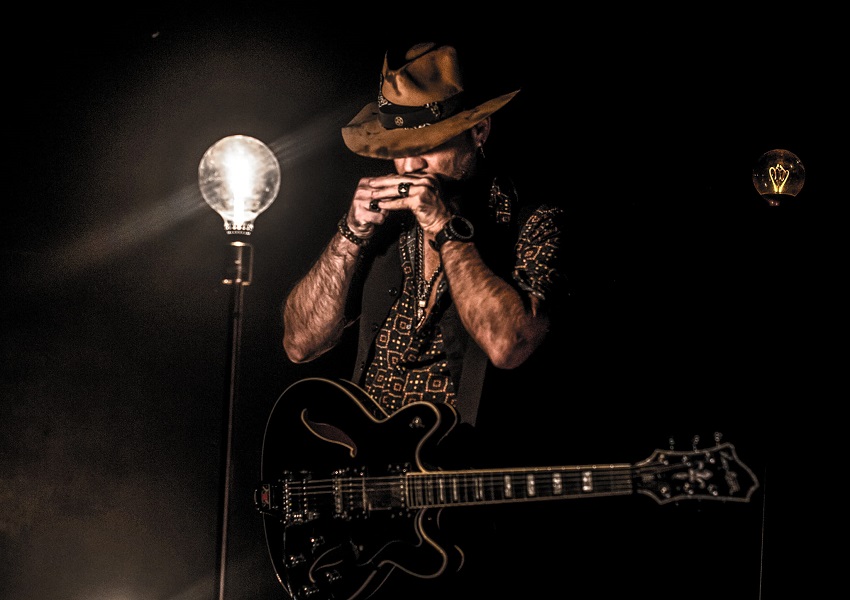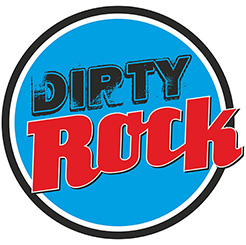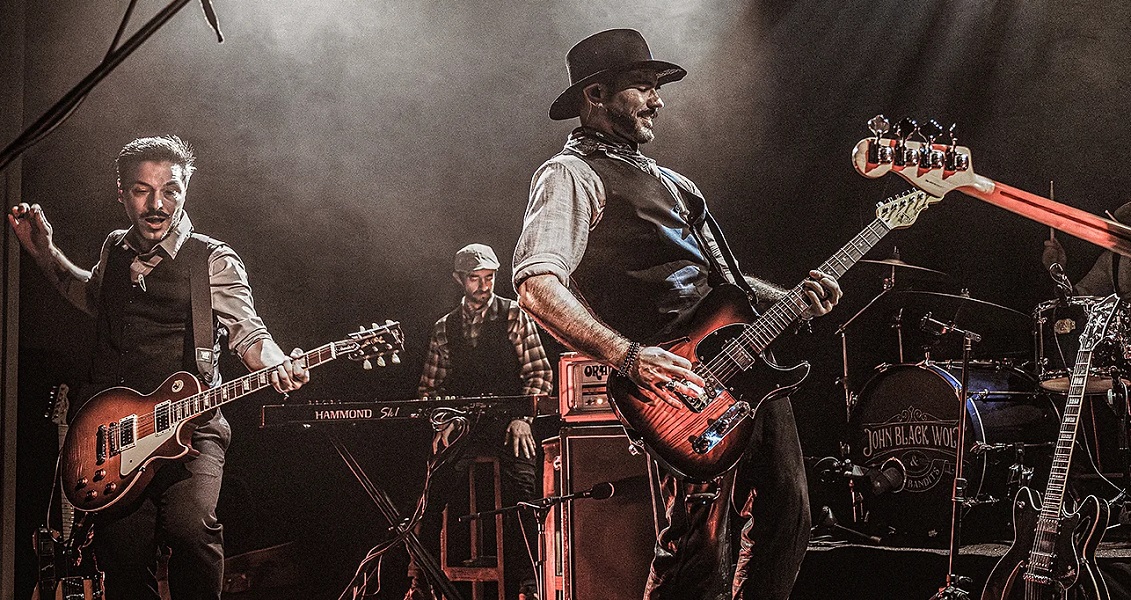John Black Wolf & The Bandits nos visitan dentro de unos días en su primera gira española. Son una de las mejores bandas portuguesas, ese país tan desconocido pero que tenemos al lado y dónde la música rock es algo incluso más underground que en España. Tres discos llenos de sonidos americanos con grandes canciones les avalan, además de mucho compromiso social como podemos ver en el fantástico videoclip de “Breaking Along The Way”, que denuncia la violencia de género. Después de editar 3 discos el proyecto liderado por Diogo Lima se encuentra en el mejor momento para expandir sus fronteras y ganar nuevos fans por estos lares de la península Ibérica, acompañado de su banda The Bandits.
Con una voz distintiva, profunda y resonante que complementa su música y su imagen como un forajido del rock, John Black Wolf a menudo se viste de negro, lo que le valió el apodo de «Black Wolf». Este es un símbolo de solidaridad con los oprimidos y necesitados. Además de la música, John Black Wolf también participa en otros proyectos artísticos, como actuar en películas y producciones de teatro musical. Es allí donde nace la vena clásica y épica de sus temas y de donde deriva el buen gusto por todo lo que rodea al grupo: logos, imagen, videoclips,… todo hecho con elegancia y calidad.
En resumen, el arte de John Black Wolf se basa en su capacidad para contar historias y evocar emociones a través de la música y la imagen de su alter ego, en una mezcla única de raíces anglosajonas. Su voz distintiva y su capacidad para incorporar temas sociales y políticos en sus letras son preocupaciones constantes en su quehacer artístico.
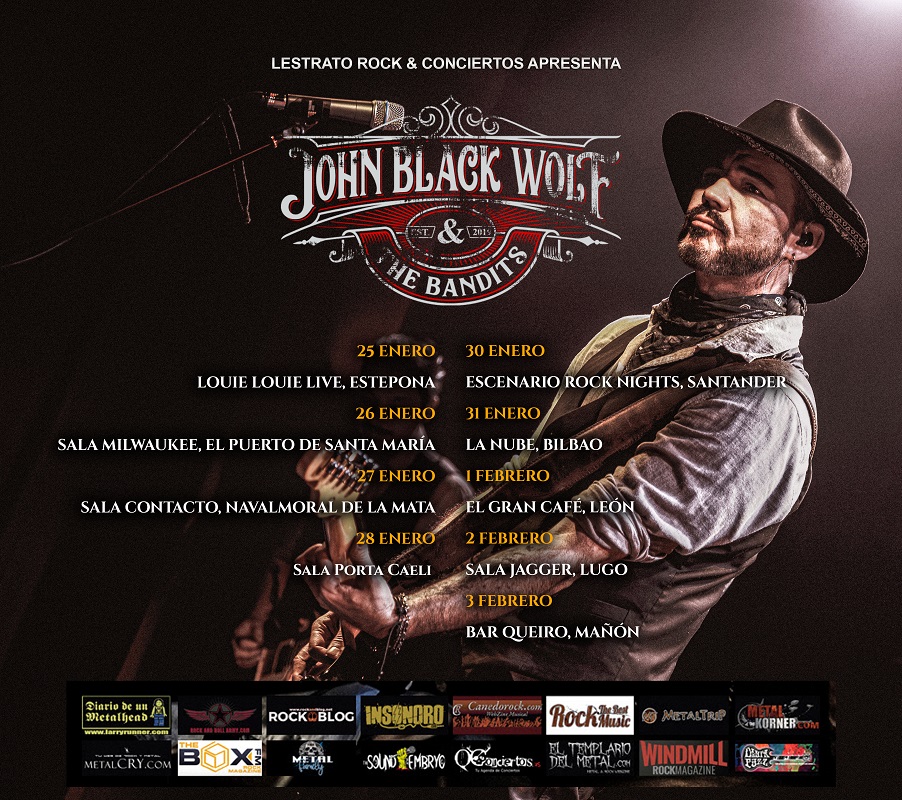
Tuvimos una conversación con John Black Wolf unos días antes de iniciar su tour y aquí tenéis las respuestas.
En primer lugar, presenta tu proyecto al público español. ¿Cómo definirías tu música?
Nuestro proyecto combina elementos de la música americana/western, folk y rock clásico, creando un puente entre el pasado y el presente, una expedición musical que te dejará anhelando el horizonte abierto y abrazando los ecos de una era olvidada.
Es tu primera gira fuera de Portugal. ¿Qué expectativas tienes?
Sí, lo es, estamos emocionados de tocar en España con nuestros hermanos ibéricos, esperamos una gran audiencia de amantes de la música, que tengan la costumbre de salir a divertirse y escuchar nuevas bandas.
Empezaste a tocar hace 25 años. ¿Ha sido fácil construir una carrera en su país?
No, es muy difícil tocar música rock en Portugal. Nuestro país no tiene muchas raíces rockeras; se centra principalmente en pop, fado y pimba. Las personas que aman el rock normalmente sólo dan crédito a bandas grandes y establecidas como Guns N’ Roses, AC/DC, Rolling Stones, etc. No sienten mucha curiosidad por los nuevos grupos, probablemente porque no creen que haya buenos grupos. Cosas en el mercado. Sin embargo, tan pronto como ven a nuestra banda en vivo, inmediatamente se conectan y comienzan a seguir futuros conciertos y lanzamientos musicales.
Sabemos que compaginas la música con el teatro. ¿Dónde te sientes más cómodo?
Ambas áreas involucran el escenario y las actuaciones frente a la gente. Creo que la música me resulta más natural, a diferencia del teatro, donde necesito profundizar en el personaje que interpreto y desafiarme con nuevos enfoques, aprendiendo con cada actuación que hago. Me siento muy competente en ambas áreas, pero si tuviera que elegir una para ganarme la vida sería la música.
¿Qué músicos os acompañarán en la gira?
Mi banda, The Bandits. Son como una familia para mí y sus miembros comparten la misma pasión por el proyecto que yo. Bruno Guana es un guitarrista destacado. Mi amigo más antiguo de la banda, lo conocí en 2011 debido a nuestro amor compartido por la música. Vasco Pereira al bajo y Nuno Ferreira a la batería constituyen el motor constante y firme de la banda. A los maravillosos coros, Filipa Guedes y Skinny Jo. Desafortunadamente, se unirán a nosotros después del 30 de enero, porque marcan una diferencia significativa en nuestras actuaciones. Con ellas, nuestros directos se vuelven más enérgicos, llenos de corazón y alma, aportando una personalidad única a la banda. Para esta gira hemos invitado a Artur Martins a ser nuestro teclista. Con una formación de blues, Artur se adaptó fácilmente a nuestra música.
Tienes algunas covers fantásticas de Springsteen en YouTube. ¿Es él uno de tus referentes? ¿Otros artistas que admiras?
Sí, realmente amo a Bruce. Me identifico con su forma de cantar, las melodías que le gusta sacar en sus canciones. Incluso tengo una banda tributo a Springsteen, eso lo dice todo. Otros artistas que admiro incluyen a Elvis Presley, Freddy Mercury, Johnny Cash y Steve Lee de Gotthard. Mientras escribo sus nombres, me doy cuenta de que todos ya se han ido. También amo a Dave Coverdale de Whitesnake, Dire Straits, Aerosmith y, en otros géneros diferentes, Nick Cave y David Bowie
Después de tantos años, supongo que tener dos nominaciones a los IPMA (Premios Internacionales de la Música Portuguesa) de 2021 debe haber sido una gran satisfacción. ¿cómo lo viviste?
Fue realmente emocionante, pero es una prueba más de que necesitamos salir de nuestro país para ser valorados. Es una organización mundial de premios musicales creada por descendientes de portugueses en Estados Unidos.
Me encanta “Breaking Along The Way” y su mensaje contra la violencia doméstica. ¿Eres consciente de los problemas sociales? ¿Crees que la música todavía tiene el poder de cambiar cosas que no funcionan?
Ciertamente, a lo largo de la historia, la música ha sido a menudo una poderosa herramienta para expresar y abordar cuestiones sociales. Tiene la capacidad de inspirar, provocar pensamientos y movilizar a las personas hacia un cambio positivo. Muchos artistas utilizan su plataforma para crear conciencia sobre los problemas sociales, abogar por la justicia y fomentar el activismo. Si bien la música por sí sola tal vez no resuelva problemas sociales complejos, puede ser un catalizador de movimientos sociales y contribuir a moldear la opinión y el discurso públicos.
En España cada vez hay menos salas y aparecen más festivales sin personalidad. ¿Cómo es la situación en Portugal?
Supongo que es peor en Portugal; por eso estamos tratando de extender nuestras alas más allá de la frontera. Con una población más pequeña, hay un espacio limitado para el rock, la música underground o alternativa en comparación con el predominio del pop o la música tradicional. En los grandes festivales, el cartel suele presentar los mismos artistas de siempre y faltan nombres verdaderamente nuevos y significativos más allá de los artistas pop. No culpo a las bandas, porque sé que hay mucha calidad ahí fuera. En cambio, culpo a los promotores y agencias por su falta de visión y coraje.
En los viejos tiempos, solíamos tener a A&Rs descubriendo bandas en clubes, bares, locales, etc. Hoy en día, tienes una persona o un bot que filtra bandas con grandes seguidores y vistas en YouTube o Spotify. Por eso el ciclo del éxito es más corto porque tener muchas visualizaciones no significa necesariamente que se tengan fans leales para siempre.
¿Qué prefieres, el proceso creativo en el estudio o tocar en vivo?
Amo ambos, proporcionan diferentes estímulos. Sin embargo, sigo creyendo que la banda siempre debería sonar mejor en vivo. Está la química, la espontaneidad y la energía del público, que realmente pueden elevar la actuación. Si pudiera, siempre estaría grabando y tocando en vivo.
¿Con qué músico, vivo o muerto, te gustaría colaborar?
Debo decir que Bruce Springsteen creo que encajaríamos perfectamente en un dúo 😊
¿Qué es lo más gratificante y lo más difícil de dedicarte a la música?
El aspecto más gratificante es tocar en vivo y recibir comentarios increíbles del público después del show. No hay nada más fuerte que eso porque te muestra que estás haciendo algo bien: jugar con los sentimientos de las personas de manera positiva. Ningún ‘no’ de la industria puede quebrarte cuando tienes ese increíble sentimiento de satisfacción. La parte más desafiante es la incapacidad de depender únicamente de la música como trabajo. Todos tenemos otras responsabilidades para sostener a la banda y a nosotros mismos. Sin embargo, me considero muy afortunado porque puedo ganarme la vida a través del arte, incluido el teatro, la televisión y los conciertos.
¿Alguna experiencia Spinal Tap que hayas tenido?
El estilo de vida de las estrellas de rock se acabó, al menos como antes. En los años 70 y 80 sólo había que pensar en hacer música y tocar en directo, dejando mucho tiempo para fiestas y excesos. Hoy es muy diferente. Si no eres un hombre de negocios dentro de tu banda, estás en desventaja. Tienes que ser el músico, el agente, el sello, el diseñador y el estilista. No hay tiempo para vivir la vida de una estrella de rock. En ese sentido, nunca he tenido esa experiencia. Sin embargo, hubo un concierto allá por 2001/2002 con una banda española (que no nombraré 😊) que tenía muchas golosinas en el backstage, supongo que me entiendes. Nos ofrecieron unirnos. Ah, ah, ah.
Siempre nos gusta acabar descubriendo nuevos artistas. ¿Algún nuevo álbum, cantante o banda que puedas recomendar a nuestros lectores?
En Portugal tenemos bandas como O Incrível Homem Bomba o Skynny Joe! (rock alternativo), Meu General (punk Rock) o The Smokestackers (blues)
Algunos nombres internacionales que recomendaría a los lectores: Amigo The Devil , The Death South y Ghost Hounds (Dark Folk, Rock) y Ash Grunwald y Josh Teskey (Shinedown Blues, Acoustic).
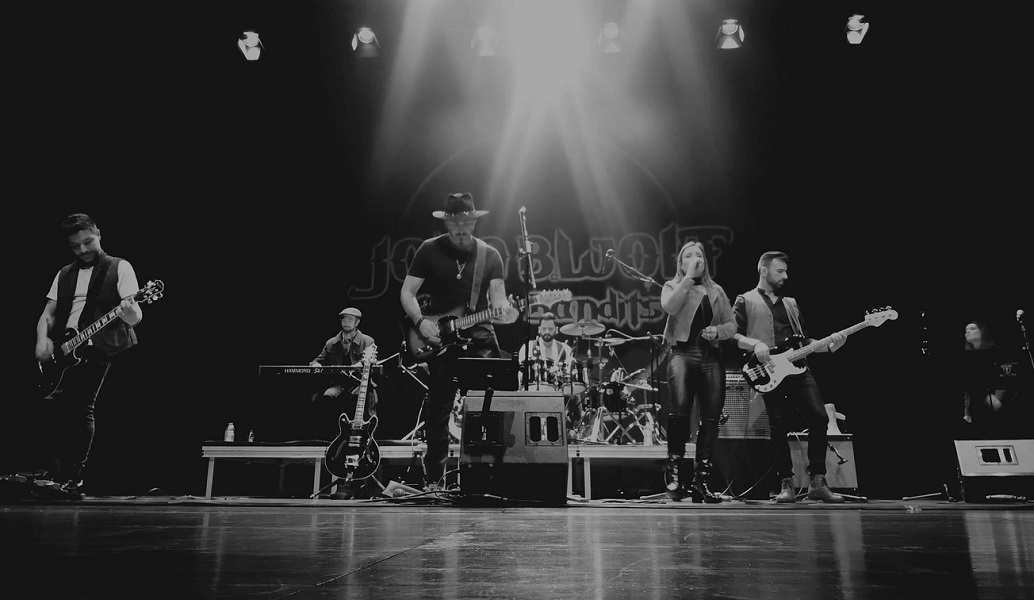
ENGLISH VERSION
First of all, present your project to the Spanish public. How would you define your music?
Our project blends elements of americana / western music, folk, and classic rock music, creating a bridge between the past and the present, a musical expedition that will leave you yearning for the open horizon and embracing the echoes of a forgotten era.
It´s your first tour outside of Portugal. what expectations do you have?
Yes, it is, we are thrill to play in Spain with our Iberian brothers, we expect a great audience of music lovers, that have the habit to go out have fun and listen to new bands
You started playing 25 years ago. Has it been easy to build a career in your country?
No, it is very difficult to play rock music in Portugal. Our country doesn’t have a lot of rock roots; it is mainly focused on Pop, Fado, and Pimba. The people who do love rock normally just give credit to big and established bands like Guns N’ Roses, AC/DC, Rolling Stones, etc. They are not very curious about new acts, probably because they don’t believe that there are good things on the market. However, as soon as they watch our band live, they immediately connect and start following future gigs and music releases.
We know that you combine music with theater. Where do you feel most comfortable?
Both areas involve the stage and performances in front of people. I believe music comes more naturally to me, unlike theater where I need to delve deeper into the character I am playing and challenge myself with new approaches, learning with each performance I do. I feel very competent in both areas, but if I had to choose one to make a living from, it would be music.
What musicians will accompany you on the tour?
My band, The Bandits, is like a family to me, and its members share the same passion for the project as I do. Bruno Guana is an outstanding guitarist; my oldest friend in the band, I met him back in 2011 because of our shared love for music. Vasco Pereira on bass and Nuno Ferreira on drums serve as the steady and tight motor engine of the band. The amazing backing vocals, Filipa Guedes and Skinny Jo, unfortunately joining us only after the 30th of January, make a significant difference in our performances. With them, our live shows become more energetic, filled with heart and soul, bringing a unique personality to the band. For this tour, we invited Artur Martins to be our keyboardist. Coming from a blues background, Artur easily adapted to our music.
«You have some fantastic Springsteen covers on YouTube. Is he one of your references? Other artists you admire?
Yes, I really love Bruce. I can identify with his type of singing, the melodies he likes to bring out in his songs. I even have a tribute band to Springsteen, so that says it all. Other artists I admire include Elvis Presley, Freddy Mercury, Johnny Cash, Steve Lee from Gotthard. As I write their names, I realize all of them are already gone. I also love Dave Coverdale from Whitesnake, Dire Straits, Aerosmith and on other different genre, Nick Cave. David Bowie
After so many years, I guess having two nominations at the 2021 IPMAs (International Portuguese Music Awards) must have been a great satisfaction. how did you live it?
It was really exciting, but it’s yet another proof that we need to go outside our country to be valued. It’s a worldwide Music Award organization created by Luso-descendants in the USA.
I love “Breaking Along The Way” and its message against domestic violence. Are you aware of social issues? Do you think music still has the power to change things that don’t work?
Certainly, throughout history, music has often been a powerful tool for expressing and addressing social issues. It has the ability to inspire, provoke thought, and mobilize people towards positive change. Many artists use their platform to raise awareness about societal problems, advocate for justice, and encourage activism. While music alone may not solve complex social issues, it can be a catalyst for social movements and contribute to shaping public opinion and discourse.
In Spain there are fewer and fewer venues and more festivals appear without personality. How is the situation in Portugal?
I guess it is worse in Portugal; that’s why we are trying to spread our wings beyond the border. With a smaller population, there is limited space for rock, underground or alternative music compared to the dominance of Pop or traditional music. In big festivals, the lineup often features the same old acts, and there’s a lack of truly new and significant names beyond pop artists. I don’t blame the bands, as I know there is a lot of quality out there. Instead, I blame the promoters and agencies for their lack of vision and courage. Back in the old days, we used to have A&R discovering bands in local clubs, bars, etc. Nowadays, you have a person or a bot filtering bands with big followers and views on YouTube or Spotify. That’s why the cycle of success is shorter because big views don’t necessarily mean loyal fans forever.
What do you prefer, the creative process in the studio or playing live?
I do love both; they provide different stimulations. However, I still believe the band should always sound better live. There’s the chemistry, spontaneity, and the energy from the audience, which can really elevate the performance. If I could I would be always recording and playing live.
Which musician, living or dead, would you like to collaborate with?
I must say Bruce Springsteen I think we would fit perfectly in a duet 😊
What is the most rewarding and the hardest thing about dedicating yourself to music?
The most rewarding aspect is playing live and receiving amazing audience feedback after a show. There’s nothing stronger than that because it shows you that you are doing something right—playing with people’s feelings in a positive way. No ‘no’s’ from the industry can break you when you have that incredible feeling of fulfillment. The most challenging part is the inability to rely solely on music as a job; we all have other responsibilities to sustain the band and ourselves. Nevertheless, I consider myself very lucky because I can make a living through art, including theater, TV, and shows.
Any Spinal Tap experiences you’ve had?
The rock star lifestyle is over, at least as it was before. Back in the 70s and 80s, all you had to think about was making music and playing live, leaving plenty of time for parties and excesses. Today, it’s a whole lot different. If you’re not a businessman within your band, you’re at a disadvantage. You have to be the musician, the agent, the label, the designer, and the figurine designer. There’s no time to just live the rock star life. In that way, I’ve never had that experience. However, there was a gig back in 2001/2002 with a Spanish band (which I won’t name 😊) that had a lot of party favors backstage, if you catch my drift. They did offer us to join in. Ah, ah, ah.
We always like to end up discovering new artists. Any new album, singer or band that you can recommend to our readers?
You can check these names in Portugal:
Alternative Rock – O Incrível Homem Bomba | Skinny Joe! Punk Rock – O Meu General Blues – Smokestackers
Some international names I would recommend to the readers: Dark Folk, Rock – Amigo de Devil | The Death South Blues Rock – Ghost Hounds | Shinedown Blues, Acoustic – Ash Grunwald & Josh Teskey
